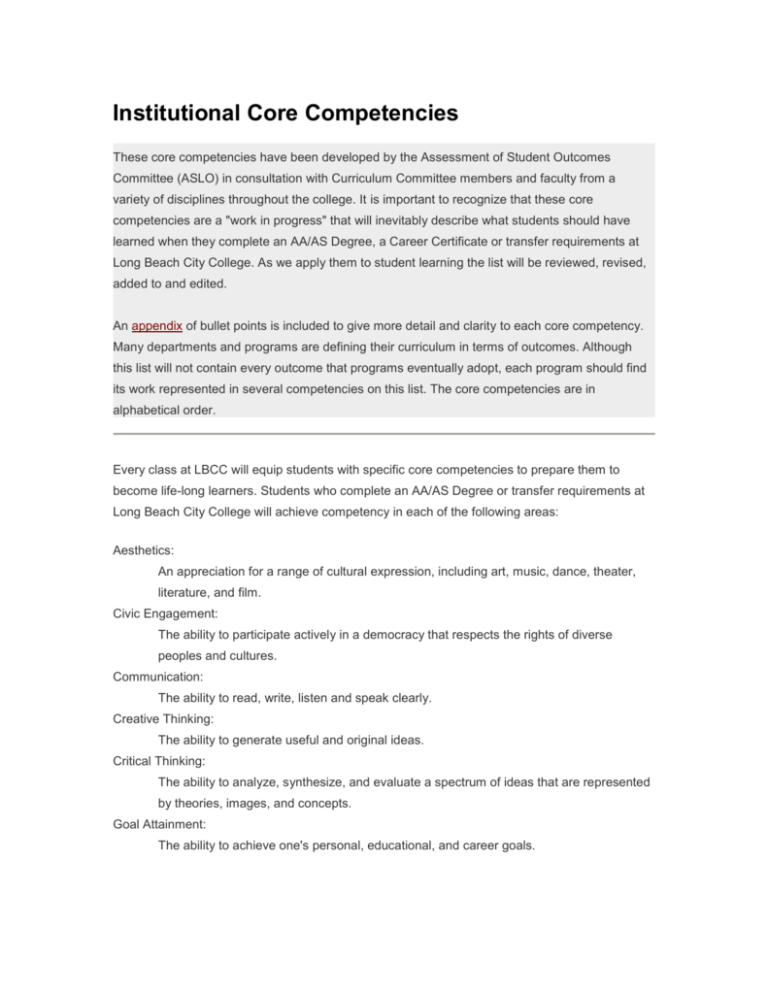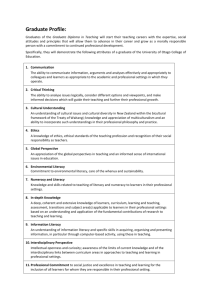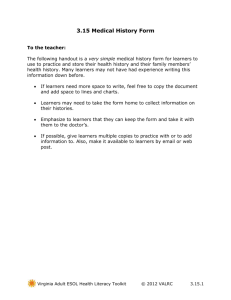
Institutional Core Competencies
These core competencies have been developed by the Assessment of Student Outcomes
Committee (ASLO) in consultation with Curriculum Committee members and faculty from a
variety of disciplines throughout the college. It is important to recognize that these core
competencies are a "work in progress" that will inevitably describe what students should have
learned when they complete an AA/AS Degree, a Career Certificate or transfer requirements at
Long Beach City College. As we apply them to student learning the list will be reviewed, revised,
added to and edited.
An appendix of bullet points is included to give more detail and clarity to each core competency.
Many departments and programs are defining their curriculum in terms of outcomes. Although
this list will not contain every outcome that programs eventually adopt, each program should find
its work represented in several competencies on this list. The core competencies are in
alphabetical order.
Every class at LBCC will equip students with specific core competencies to prepare them to
become life-long learners. Students who complete an AA/AS Degree or transfer requirements at
Long Beach City College will achieve competency in each of the following areas:
Aesthetics:
An appreciation for a range of cultural expression, including art, music, dance, theater,
literature, and film.
Civic Engagement:
The ability to participate actively in a democracy that respects the rights of diverse
peoples and cultures.
Communication:
The ability to read, write, listen and speak clearly.
Creative Thinking:
The ability to generate useful and original ideas.
Critical Thinking:
The ability to analyze, synthesize, and evaluate a spectrum of ideas that are represented
by theories, images, and concepts.
Goal Attainment:
The ability to achieve one's personal, educational, and career goals.
Information Technology and Computer Literacy:
The skills necessary to find, use, manage, evaluate, and convey information efficiently
and effectively.
Numeric Literacy:
The mathematical and arithmetic skills necessary to solve everyday problems.
Science Literacy:
The ability to apply the scientific method to gain an evidenced-based understanding of
contemporary issues.
Teamwork and Collaboration:
The ability to cooperate and work effectively with individuals and groups using
appropriate social skills.
Wellness:
The ability to make lifestyle choices that promote physical, mental, and social health.
Appendix
Aesthetics
o
A respect for the arts as a means of personal, cultural, or social expression.
o
An appreciation of design principles common and uniting all of the arts.
o
A willingness to seek out and encounter art, music, dance, and/or theatrical
experiences to enhance the student's leisure pursuits.
Civic Engagement
o
Applying the knowledge, understanding, and skills required to play an active,
effective role in public life as informed participants who are socially and morally
responsible and who are involved in the life and concerns of their local, national,
and global communities.
o
A broadened perspective, fostering an appreciation of other groups' differences;
an increased understanding of other groups in order to promote respect and
acceptance among people.
o
An appreciation of the social and political processes that sustain our society.
o
An understanding and tolerance of individuals from different cultural, religious,
ethnic, social, gender and political backgrounds, as well as of different ideas and
beliefs.
Communication Skills
o
The skills of communication needed to act within the framework of a society
based on information and service.
o
The ability to express ideas effectively in written and verbal form.
o
The ability to comprehend verbal and written information.
Creative Thinking
o
The ability to use creative strategies, such as learning to change perspective in
order to generate new ideas.
o
The ability to develop a familiarity with higher levels of thinking such as synthesis
and analysis.
o
The ability to use creative thinking for the purpose of enhancing one's original
ideas and express one's imagination.
Critical Thinking
o
Reasonable, reflective thinking, the propensity to engage in an activity with
healthy skepticism.
o
Problem-solving decision-making, constructing and deconstructing arguments.
Goal attainment
o
Ability to navigate the college environment in order to use college resources to
achieve one's educational goal.
o
Exploration of career options, enabling one to find, enter and progress in a career
suited to one's interests and goals.
Information Technology and Computer Literacy
o
The ability to function in a computer-enabled environment.
o
The ability to function in existing and emerging technologies applicable to your
field.
o
The ability to evaluate the credibility and significance of information.
Numeric Literacy
o
The ability to utilize mathematical language to describe and interpret situations.
o
The ability to apply basic mathematical concepts and operations in the analysis
of situations and the solutions of problems.
o
The ability to appropriately utilize fractions and decimals.
o
A basic familiarity and facility with the fields of arithmetic; geometry; basic
algebra; statistics; and probability.
Science literacy
o
An understanding that the scientific method is a means of gaining a reliable body
of knowledge about a given subject area.
o
An understanding that science is an evolving process that involves experimental
verification and feedback/correction as necessary.
o
A basic introduction to a field of science to gain an understanding of the world
and ourselves.
o
A familiarity with currently accepted major theories of science.
o
The ability to separate fact from opinion.
o
An understanding that science does not use supernatural explanations.
Teamwork and Collaboration
o
Demonstration of adequate social skills, such as withholding judgment, learning
to feel and communicate empathy, apologizing when appropriate, acceptance of
other viewpoints, tentative expression of opinions with openness to being
influenced by other, and skill in eliciting the views of others.
Wellness
o
The ability to manage stress.
o
The ability to improve one's energy and reserve capacity for meeting daily
demands.
o
The ability to become involved in community and relationships that nurture a
supportive environment.
LBCC ASLO Committee
4901 East Carson Street
Long Beach, CA 90808
Long Beach City
College
© 2007 All Rights Reserved
ContentJanice
Manager:Tomson
Technical
ACIT
Contact:
General Education Student Learning Outcomes
for Academic and Vocational Degree Programs
Riverside Community College
Critical Thinking
• Analyze and solve complex problems across a range of
academic and everyday contexts
• Construct sound arguments and evaluate arguments of
others
• Consider and evaluate rival hypotheses
• Recognize and assess evidence from a variety of
sources
• Generalize appropriately from specific cases
• Integrate knowledge across a range of contexts
• Identify one’s own and others’ assumptions, biases, and
their consequences
Information Skills
• Demonstrate computer literacy
• Locate, evaluate, and use information effectively
Communication Skills
• Write with precision and clarity to express complex
thought
• Read college-level materials with understanding and
insight
• Listen thoughtfully and respectfully to the ideas of others
• Speak with precision and clarity to express complex
thought
Quantitative Reasoning
• Identify and extract relevant data from mathematical
applications
• Select known models or develop appropriate models that
organize data into tables, spreadsheets, graphical
representations, symbolic and/or equation format
• Use arithmetical, algebraic, geometric, and/or statistical
methods to solve problems
• Develop solutions, checking for reasonableness and
stating with appropriate qualifiers
• Use the symbols and vocabulary of mathematics to
clearly communicate results
Breadth of Knowledge
• Understand the basic content and modes of inquiry of
the major knowledge fields
• Analyze experimental results and draw reasonable
conclusions from them
• Respond to and evaluate artistic expression
Application of Knowledge
• Maintain and transfer academic and technical skills to
workplace
• Be life-long learners, having the ability to continue
education to acquire and employ new knowledge
• Set goals and devise strategies for personal and
professional development
Global Awareness
• Demonstrate appreciation for civic responsibility and
ethical behavior
• Participate in constructive social interaction
• Demonstrate teamwork skills
• Demonstrate understanding of and tolerance for ethnic,
religious, and socioeconomic diversity
• Demonstrate understanding of alternative political,
historical, and cultural viewpoints
LACC CORE COMPETENCIES
Area 1: ESSENTIAL ACADEMIC SKILLS
Information Competency: Critical and Creative Thinking
Learners read, gather, evaluate, organize, and synthesize information from a variety of
sources and media and use appropriate reasoning, analytic, interpretive, and problem solving
strategies to draw logical conclusions or formulate creative solutions.
Written and Oral Communication
Learners produce clear, logical, well-organized papers and verbal presentations using
documentation and quantitative tools when appropriate.
Mathematical Competency/Quantitative Reasoning
Learners represent mathematical information symbolically, visually, numerically, and
verbally; they use mathematical models such as formulas, graphs, tables, and schematics and
draw inferences from them; they arrange data into tables or graphs.
Technological Literacy
Learners use computers and related technologies to achieve academic, personal, and
professional goals.
Area 2: PERSONAL GROWTH AND DEVELOPMENT
Self Assessment and Growth
Learners reflect upon their academic, personal, and professional growth and make changes
based upon their resulting insights.
Intellectual Engagement and Physical Wellness
Learners develop intellectual curiosity that leads to lifelong learning, using that knowledge
and understanding to generate and explore new questions; they establish and maintain a
healthy lifestyle that includes practices that result in a healthier mind, body, and spirit for the
learner as well as the learner’s community and the environment.
Ethical Reasoning
Learners make informed and principled choices regarding conflicting situations in their
personal and public lives and foresee the consequences of these choices.
Aesthetic Awareness and Appreciation
Learners evaluate and analyze their own aesthetic responses to the world around them,
including natural objects and human creations.
Area 3: INTERPERSONAL/ INTERCULTURAL/ GLOBAL AWARENESS
Interpersonal Interaction and Community Participation
Learners cooperate and collaborate to reach desired outcomes when working with other
people, recognizing their personal contribution to the community and to society at large.
Intercultural knowledge and exploration
Learners interact successfully and sensitively with individuals and groups holding a variety
of perspectives and who may come with diverse backgrounds and experiences.
Discovering Global Issues
Learners recognize and analyze the interconnectedness of global and local concerns,
analyzing cultural, political, social, and environmental issues from multiple perspectives; they
recognize the interdependence of the global environment and humanity.
Core Competencies
Cabrillo College
Upon completion of Cabrillo College’s General Education program, a student will
demonstrate competency in the following areas:
I. Communication
A. Reading
B. Writing
C. Listening
D. Speaking and/or Conversing
II. Critical Thinking and Information Competency
A. Analysis
B. Computation
C. Research
D. Problem Solving
III. Global Awareness
A. An Appreciation of Scientific complexities
B. An Appreciation of Social diversity and civics
C. An Appreciation of Artistic variety
IV. Personal Responsibility and Professional Development
A. Self-Management and Self-Awareness
B. Social and Physical Wellness
C. Workplace Skills
ARC - General Education Student Learning Outcomes
For more info. on the process ARC utilized see:
http://ic.arc.losrios.edu/~geslo/
I.
Humanities
At the completion of the Humanities general education requirement, the
student will be able to:
II.
Identify values of a culture as expressed through its art or
language; or
Employ concepts or theories of a subfield of the humanities to
analyze and evaluate works produced within that subfield; or
Analyze and interpret events or artistic/linguistic works in light of
historical forces/patterns; or
Assess works produced within a subfield of the humanities as
critical commentaries of culture.
Language and Rationality
a. English Composition:
At the completion of the English Composition portion of the Language and
Rationality general education requirement, the student will be able to:
Demonstrate effective expository and persuasive writing skills
using the rules of standard written English in a written assignment
of at least 1,000 words.
Employ an academically recognized format (e.g., Modern
Language Association, American Psychological Association, etc.)
in a research paper.
Revise, proofread and edit written work.
b. Communication and Analytical Thinking:
At the completion of the Communication and Analytical Thinking portion
of the Language and Rationality general education requirement, the
student will be able to:
Organize and analyze information relevant to a problem or issue.
Develop and interpret a conceptual, visual, oral or physical
representation of a problem or issue.
Develop a reasoned solution to a problem.
Defend a position or explain a solution, using appropriate language
and/or notation.
Evaluate arguments, algorithms and/or solutions.
Apply learned problem-solving skills to new situations.
III.
Distinguish the form of an argument from its content.
Living Skills
At the completion of the Living Skills general education requirement, the
student will be able to:
IV.
Identify and apply skills and knowledge necessary to function
capably as an individual within society to achieve academic,
career, and/or personal success as a lifelong learner.
Formulate and monitor progress toward achieving well-defined
goals that lead to one's personal, social, physical, and emotional
well-being through the process of on-going self-evaluation,
personal awareness and self-motivation.
Demonstrate personal management skills such as planning, time
management, coping with anxiety, and the ability to work
cooperatively with others.
Recognize and explain the relationships between the social and
physical environment with regards to human behavior,
relationships, sexuality, nutrition, physical fitness, health, and
stress management.
Apply successful techniques for exploring and/or resolving
conflicts and dealing with differences in a variety of settings.
Natural Science
At the completion of the Natural Science general education requirement,
the student will be able to:
Evaluate new and accepted ideas about the natural universe using
testable methodology.
Articulate orally and/or in writing the importance of continuous
examination and modification of accepted ideas as a fundamental
element in the progress of science.
Sort, arrange, and quantify objects using the international system
of measurement (metric) as the standard.
Recall basic definitions and fundamental theories of an
introductory natural science.
Analyze a wide variety of natural phenomena using basic
definitions and fundamental theories of an introductory natural
science.
Apply appropriate quantitative and qualitative methods to interpret
and analyze pertinent data.
Recognize ethical components of scientific decision making and
apply personal and social values within the process of decision
making in scientific endeavors.
V.
Social Sciences
.
American Institutions:
At the completion of the American Institutions portion of the Social and
Behavioral Science general education requirement, the student will be
able to:
Critique the constitutions of the United States and California, and
other founding documents.
Analyze the relationships of individuals, groups, and societies at
the federal, state and local levels, including conflict resolution and
the establishment of governing processes.
Evaluate significant events in the entire area now included in the
United States of America, including historical and ongoing
influences of social, cultural, and economic groups, and regions
they inhabit.
Assess the influence of the aforementioned groups on domestic
and foreign affairs within a framework of politics, economics,
social movements, and geography.
a. Introductory Behavioral and Social Science Methods:
At the completion of the Introductory Methods portion of the Social and
Behavioral Science general education requirement, the student will be
able to: to:
VI.
Differentiate and evaluate the methods of inquiry and evidence
used in the behavioral and social sciences.
Critically assess the dynamic interaction between individuals and
societies, and compare the functioning of subgroups within and
between different societies.
Ethnic/Multicultural Studies
At the completion of the Ethnic/Multicultural Studies general education
requirement, the student will be able to:
Examine one's own culture from a removed perspective.
Examine various cultures/ethnicities through the authentic
voices/perspectives of those same cultures.
Investigate how several cultural/ethnic groups have interacted
through time.
Analyze how the concepts of ethnicity, ethnocentrism, and racism
shape and explain ethnic experience.
Synthesize 1 & 2 into an appraisal of one's own identity within
local cultural contexts.








